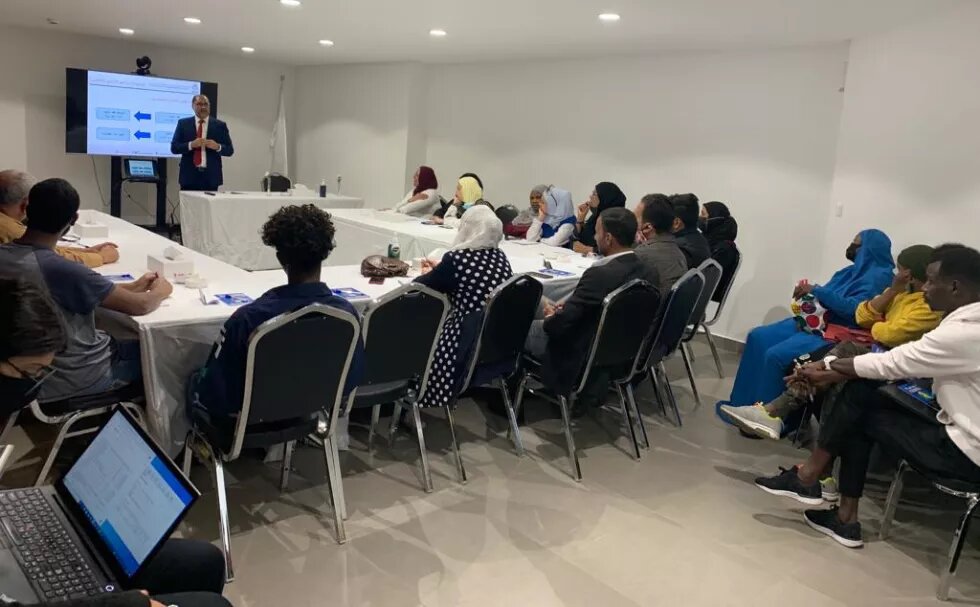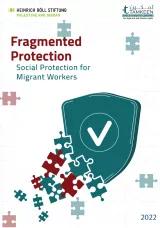
By Noor AL Saleh
Around three million migrants and refugees live in Jordan[1]. Some of them fled their countries for political reasons, other came looking for a better life. Yet behind those migrants and refugees, there are stories of hope, courage, exile and belonging; stories that usually remain hidden until an entity takes an initiative to bring them to light.
Growing up in Jordan, I have witnessed the diversity in the country. There has always been movement and culture that is being shared. Throughout the years, I have also witnessed the influx of refugees and migrants leaving everything behind; some starting over again, others working hard to support their families left back home. I have always felt the fear that haunts those migrants to speak out. I learned about stories of unfairness and long working hours and wondered why someone should speak on behalf of those migrants; why can’t they voice their concerns, fight for their rights and enjoyment of the privileges and freedoms so many take for granted.
Although respect for and protection of migrant workers` rights lie at the core of Jordanian Labor Law, migrants still face the challenge to voice their concerns and needs and are thus not heard. The lack of awareness among migrant workers and Jordanian employers about their rights and responsibilities necessitated the establishment of a platform to raise the awareness for all.
In response, a migrant committee to empower, protect and promote the rights of those migrant workers has been established by The Arab Renaissance for Democracy and Development (ARDD), as part of the “Haquna” (Our Rights) project, implemented in partnership with the Heinrich-Böll-Stiftung - Palestine and Jordan.
“It is finally happening,” said Arwa, a migrant worker from Somalia. What touched Arwa the most during the “Strengthening the Voices of Migrant Workers in Jordan” dialogue organized by ARDD, was witnessing the presence of influential decision-makers who care and believe in their cause as migrants.
Arwa is among 30 migrant workers who were selected as representatives to voice the concerns of migrant workers in Jordan. The committee is working as a vibrant platform, through which migrant workers can advocate for their rights. It is a place where violations committed against migrant workers are documented and where migrant workers are informed about their legal rights. It is a shield for those without social protection and a place where migrant workers offer support to one another.
Abkar, another migrant worker from Somalia, thinks that what harms refugees and migrants the most is the lack of knowledge and awareness of the laws of their host countries. “This lack of knowledge could subject them to exploitation,” the 24 year old stressed. “The legal awareness workshops implemented as part of Haquna project, would serve as a protective shield from such exploitation,” he continued.
The members of the migrants’ committee were selected from eight different nationalities, both men and women, based on criteria determined by ARDD. They represent most nationalities working in Jordan and speak both Arabic and English to facilitate communications.
One committee member is an asylum seeker from Syria who is hoping that the committee will help him in his case. The 40-year-old unemployed man, who opted to remain anonymous, has been waiting for his papers from the UN Refugee Agency (UNHCR) since 2010 so he would be able to leave the country. “I am officially here based on the UNHCR card that says I am an asylum seeker. I hope the committee will help in following up our papers that are stuck at the UNHCR,” he said.
One of the many issues that migrants asked to be addressed was that migrant workers be provided residences without losing their UNHCR cards. Additionally, many of the migrants in Jordan who came as refugees are requesting work permits to enjoy more rights and privileges. This could provide a much-needed economic boost to the roughly 630,000 Syrian refugees registered in the kingdom, the majority of whom live below the poverty line and rely on humanitarian aid for survival. According to the UNHCR, to date, around 62,000 work permits have been granted to Syrian refugees, but the rest are still waiting. However, the challenge is that when refugees ask for work permits, their UNHCR cards are cancelled. If they do not get the permits, they will neither be treated as refugees nor as migrant workers.
One of the two community initiatives that were formed out of the brainstorming sessions organized by ARDD, is called “Aman” (Safety). It asked for putting an end to bullying faced by migrant children by providing psychological support sessions. According United Nations International Children's Emergency Fund (UNICEF), bullying has been identified as one of the main concerns for Syrian refugee adolescents. In a stressed economy, social disharmony is spurring bullying among children, whether in classrooms or dusty courtyards.
While Jordan has ratified conventions and amended the Labor Law to be in line with the international labor standards, there has been little progress on the agreements concerning migrant workers in Jordan since 1990. By law, foreign workers must be treated the same as Jordanian workers. This includes registering them in the social security system and providing them with a decent work environment. Despite this, many migrant workers are working more hours than allowed by law, exposed to high risks and working in unsafe environments with no health insurance.
“We live in the shadows of society, we cannot speak out for fear of being expelled by the employer,” one migrant worker said.
As part of its efforts to bring labor legislation in line with international standards and agreements, ARDD is working to help improve the legal, economic, and social conditions of workers in Jordan through offering migrants a safe platform to speak for themselves rather than others speaking on their behalf. Since its founding in 2008, ARDD has been actively promoting for a change in the narrative on migrant workers’ rights from one of fear, division, and exclusion to one that reaffirms our shared values and belief in human rights for all. At the end, no one was born without a voice.
[1] UN Department of Economic and Social Affairs



